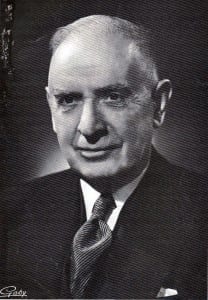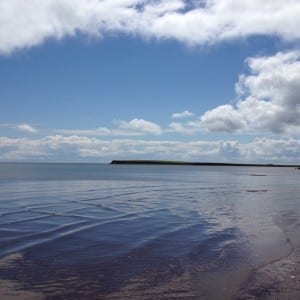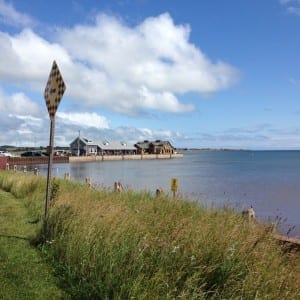Graeme Decarie: My Biggest Mistake – Ch. 4 of Graeme’s Autobiographical Stories
Check here for previous chapters in Graeme Decarie’s Autobiography Stories >
Among recent posts about Graeme is one entitled:
“It makes me, correctly, look very bad”
“I gave this one a lot of thought before deciding to send it,” Graeme Decarie comments in a recent email. “It makes me, correctly, look very bad. But it’s a small and widely scattered audience.”
My Biggest Mistake
I have dreaded writing this chapter because I have to mention something I did that was wrong, terribly wrong.

Graeme Decarie, Aug. 6, 2016. Moncton, N.B. In an email comment about the photo, Graeme writes: “It doesn’t capture the lush glory of my hair.”
It began in the very early summer of my third year at UPEI [University of Prince Edward Island]. I was attending the annual meeting of the Learned Societies where I met Robin Burns, a professor at my old school, Sir George Williams. Robin told me there was an opening at Loyola College in Montreal, and advised that I apply for it. He pointed out that Loyola and Sir George would soon merge (to become Concordia University).
I liked the idea of returning to Montreal. So I went for the interview. And I left it with a job at Loyola College. It was to begin immediately. So I resigned from UPEI, loaded a van, and moved the family to Montreal.
I liked Loyola. But I soon realized that Montreal had changed. The separatist movement was making itself felt. It was demanding a French-only Quebec. One of its claims was valid. It was true that leading English businessmen operated their businesses in English only, cutting off opportunities for the French. However, that argument was just a cover for the bigotry and street wars on both sides I had known in my childhood.
Yes, wealthy English business men acted with arrogance and a sense of privilege. But so did French ones. The French education system was designed to create a similar social structure in French Quebec. The French schools were designed to provided minimal education, commonly ending at grade 9, and largely religion-based. No child was going to go far with that background.

Graeme Decarie, History professor at Concordia University, discusses the history of anglophones in Quebec in The Rise and Fall of the English in Montreal (1993).
The wealthy French sent their children to private schools which provided a much more academic curriculum. The result was that the children of the wealthy were groomed to become wealthy adults. This effect of privileged education for the rich was so marked that almost every premier in the history of Quebec has been a private school graduate. Even Rene Levesque attended private school – though he didn’t finish.
In fact, Quebec was not a province of rich English and poor French. Both language groups were economically much the same. The majority of the English, by far, were working class, and commonly at the lowest level of the working class. Much of the separatist movement was based on a myth of English wealth and French poverty, and based on all the bigotry and hatred that myth created. At the core of the movement were those wealthy French who wanted to displace the wealthy English for access to government handouts. And it worked. That’s where Bombardier Inc. came from. It is not a coincidence that a wealthy man like Jaccques Parizeau became leader of the movement.
Montreal was becoming a very ugly place, with street violence that seemed sure to escalate.
Soon after my return to the city, I was asked to serve on the board of a group, Alliance Quebec, that was formed to protect English rights. I realized that nothing could be done to stop the damage that was coming. English companies would simply move out, and take their employees with them. (And so they did in the biggest population shift in Canadian history).
But something had to be done for those who would remain. Institutions that provided social help, for example, had to be maintained. And so I became deeply involved with a movement that would eat up twenty years of my life in meetings, visits across the province, speeches, dodging mobs (our offices were fire-bombed), with my latter years as Chairman.
As soon as I returned to Quebec, I realized the danger of very serious violence. Indeed, it had already begun with riots and killings. At the end of the first year, I insisted that Molly and the children had to move to Kingston because there was danger in Montreal – and no future whatever.
So, after a year, it was done. I visited every weekend and holiday. But it was not the same as being a husband and father. Worse, the relationship between me and Molly cooled. By the time the girls finished high school, Molly had gone from cool to frigid to intense dislike of me. And quite justifiably so. I had destroyed much of her life – and I had not been the father I should have been.
I was wrong. I was entirely and terribly wrong, so wrong it is painful for me to write about it even now. And so wrong I can never fix it or make it up with an apology. That’s why I have put off writing this chapter for months.
It was Molly, far more than me, who produced two girls who have grown up to be far better than me.
___________________________________________________________
It was during my first year back in Montreal that CBC interviewed me about an incident (I forget what incident) in Montreal’s history. Next day, they phoned to asked if I had any more stories. And that began over a dozen years of weekly appearances on Home Run, the show for people driving home after work. That, in turn, led to many years of appearances on CBC radio and TV, CTV and Global TV – and a few on BBC TV and CBS TV, most of the latter doing political commentary.

Portrait of Very Rev. Dr. Malcolm A. Campbell. Photographer: Gaby. Source: 1963-64 Malcolm Campbell High School yearbook
And that led to countless requests for me to be a speaker at events ranging from the closing of a church (it was a church whose last minister had been the Rev. Malcolm Campbell after whom the high school I had taught in was named) to visiting delegations from the European Union to teachers’ convention to Synagogues – and all over the province for Alliance Quebec. At a low estimate, I must have spoken on at least 2500 occasions to such groups, with audiences from 30 (as with the EU delegation) to 300 (as in monthly talks at a library) to a thousand – as at teachers’ convention. (Where, I immodestly add, I was awarded the title “History Educator of 2003”.)
It also led to involvement in five or six National Film Board productions as advisor, participant, writer, and ‘voiceover’.
Then there was Reader’s Digest. I had never thought much of the magazine. But it paid well. And I needed the money. (The five extra years in university had been very expensive.) So I wrote a short story about my landlady when I was a student at Acadia. It was called “Mrs. Herbert D. Johnson’s Florida Soiree”.
That would lead to contracts for two, coffee-table books on the histories of the U.S. and Canada. And, as I remember it, three more articles.
I never talked on CBC radio about separatism. But CBC was nervous about me. The French section of CBC Montreal was openly and vocally pro-separatist. It made no secret about that. But it strongly disapproved of the anglo part of the network having any opposite opinion. So the anglo section made it a point to have no opinion at all. And there I was as a regular figure in the news being quizzed on separatism.
“I’m sorry, Graeme. But you know CBC policy on being politically active.”
Yeah. I knew it. And I knew it applied only to the English side.
But it didn’t last long. One day, I was invited to have lunch with Gord Sinclair, news chief and leading light of Montreal’s leading English radio station, CJAD. I had heard him on air way back when I was 13 or so, and he was a radio hit from the start.
I had the usual suspicions of people in private radio – and some of those suspicions turned out to be right. But Gord was a man above all the rest. We seldom agreed on anything political; but on the first day I appeared he told me he would support me no matter what I said. And he proved as good as his word. I did the noon hour editorial every day, including Saturdays, then I was on right after to argue with Tommy Schnurmaker, Gord, Jim Duff – all stars on Montreal radio.
I also came to admire Gord as a radio host. He sounded interested in what people had to say. And it was natural because he respected people, and he wanted to hear them. He was like that in private conversation, too.
Alas! Gord died in my twelfth year. And I knew what to expect. I was promptly dumped by the station. I suspect (know) this was the result of pressure from the Israeli lobby in Montreal. I had a large, Jewish audience in Montreal on air, in libraries and at synagogues. That audience had long impressed me with its Judaic respect and courage for free speech. Indeed, I lived more in Jewish circles than Christian ones. (I had learned that Christian audiences wanted jokes. Jewish audience expected serious talks with meat to them. And they had a tradition of interest in serious causes which was rare among Christian audiences.)
But the Israeli lobby is not a typical Jewish group. It is a propaganda house for the Israeli government. Nothing more. And I was promptly replaced by one of its leading propagandists as a commentator.
___________________________________________________________
I loved teaching university. And I took pride in the annual student evaluations of my teaching. I commonly was the top-ranked teacher in the history department – even though I was seen as a hard marker.
But universities don’t have much interest in teaching. A professor who has been trained to teach is extremely rare. Nor are they encouraged to teach well. In fact, many regard teaching as an imposition on their valuable time. They don’t want to teach. They don’t want to know. and they don’t care. Others see teaching essentially as a means to dazzle their students (and each other) with their intellectual greatness.
As for Curriculum Development, forget it. It is common, especially with large classes, simply to drum information in them to be memorized and repeated on exams. It’s called rote learning, and I had many years of it as a student from BA to PhD. And it’s a waste of time. I remember and have use for almost none of it.
In history, for example, memorized information is usually forgotten after the exam. It’s useless. What can one do with knowing what year the election of 1896 was? But professors love that because most don’t know how to teach anything else.
In history, students need to learn how to find information for themselves, how to present it, how to judge its meaning and value. You can’t do that in a course on Canada from then to now. Given time, and availiability of material, all one can do, really, is to focus on a few periods – say, the War of 1812, the Great Depression, the real reasons why Canada has fought wars for Britain and the U.S.
History is not about memorizing the names of prime ministers. It’s learning about how to understand and to make judgements about how people have behaved. And that is a usefulness that won’t be forgetten, and will carry on well beyond history, itself.
One of our professors was in ecstasy when he got a text book that included the exam for the teachers’ use. It was a list of fifty statements, each to be checked as yes or no. Why, he could now mark his exams in minutes instead of the hours it takes to go through essay answers.
But can a bunch of yesses or nos tell a teacher about the processes of thinking and expressing?
I also took a course in the poetry of Chaucer. The whole course was spent with us reading around the room, something I hadn’t done since grade four. Poetry has meanings and values to express. Not surprisingly, no audience I have ever spoken to has ever said a word about Chaucer. It was like learning to read French without being told what the words mean. That why people think it’s okay to say “Chrisde’enfantchien”.

Given that Graeme’s chapter begins with a reference to Prince Edward Island, I’ve included this photo, from a July 2015 summer vacation, from Prince Edward Island. Jaan Pill photo
But History and many other programmes in the university are not taught so that people can learn. They are taught to get a favourable mention in Maclean’s annual review of universities. And what Maclean’s understands is trendiness. Thirty years ago, historical statistics were trendy. But that’s old. Now, it’s lawn-mower history or something like that.
What, commonly, it isn’t about is learning how to think.
Oh, and I remember my final PhD Oral Exam. The professor of British history (a minor field for me) had asked me to recite the response each member of the British cabinet made on the declaration of war in 1914.
I had been expecting something like this. It was an aburd, pointless, and obscure question from a professor who badly wanted me to fail. Luckily, that was equally obvious to the rest of the examiners. (I hope he cried himself to sleep that night.)
Later that day I encoutered a similar example of academic pettiness. A fellow student phoned me. I could hear his almost hysterical giggling when he asked, “Did you pass?”
“Yes.”
Silence. End of giggles. Then a wobbly, doubting, “___oh…uh…oh…’ and a very uncertain “Congratulations”
A month later, he would flunk the exam. But he lied his way into a life job as a proressor, anyway.
All of this leads me to a final note on the academic experience.
About 1990, I was surprised to be invited to a meeting with Eric Molson (chairman of the board) with a lot of lawyers all dressed as henchmen for Batman’s The Pelican, and the president of the university.
Concordia had just fired a disastrous one – and I knew his replacement had not been entirely satisfactory. He left the meeting early to watch a football game. Then the lawyers surrounded me.
Then mentioned money that could have been piled to the ceiling. They told me I would continue to get it even if they later decded to fire me, too. Oh, and my mortgage would be interest free. And the university would give me a credit card for any little dinners, travels, etc. I might need.
All I had to do was to become President.

Prince Edward Island, July 2015. The images from PEI featured here are from a previous post entitled: Graeme Decaries discusses what we know and don’t know about the British Royal family (especially as it relates to 1930s). Jaan Pill photo
It was pretty heady stuff. But even as i stalled I knew I didn’t want it.
First, I was a teacher. I had been one most of my life. I loved teaching.
I didn’t love administration. I had been department chair for many years. I learned there that change in a university is close to impossible.
And all that money? I thought of Henry Hall who had been the major builder of the Sir George Williams that became Concordia. He was a magnificent educator. Thousands owe all they are to him. He retired a few years before my arrival as a very junior professor. His pension had was less than half my starting salary.
All that money. Was I being paid? Or bought?
I said no. I’ve never regrretted it. With two sons in unversity, a daughter in private school and a separated wife, I’m relatively poor. But it’s been, mostly, a pretty happy and satisfying life, one that I would not have dreamed possible before that first day about 1956 that I went to supply teach at Morison School close to Bombardier where a kid called me “old man Decarie”.




We owe thanks to a discussion at the MCHS ’60s Reunion Facebook Page, to help in ensuring that Morison School was indeed where Graeme Decarie began his teaching career.
I relayed the Facebook discussion to Graeme who replied: “It was Morison for sure. I knew Parkdale because I taught there for three years. But my first supply teaching job was at Morison.”
More details about the launch of Graeme’s teaching career are available at a post entitled:
“Whenever I have a spare moment,” notes Graeme Decarie, “I write a bit about my life for my children.”
In the above-mentioned Facebook dialogue, Gordon Bell commented: “Morison School was in proximity to Bombardier (Canadair) but Parkdale School was closer, just across the old Tramway Tracks (Cartierville to Garland Terminal).”
Klaas Vander Baaren commented: “You could hear them testing the jet engines from Morison school. We lived around the corner on General Giraud for 2 years.”
Jaan Hendrik Pill commented: “A friend (he was francophone, I was anglophone) and I used to ride our bicycles to a fence by Canadair where we could watch small fighter jets taking off, I guess for testing. We both enjoyed hearing the screech of the engines.”
I came across the comment of your from 5 years ago and had to add my experience with the roar of the jet engines you are talking about. Unlike you, I llved in Saraguay at the time, and when Cartierville Airport runway was extended to handle the new jets being built at Canadair, our house on Martin Avenue just happened to be exactly in line with the end of that runway. As a result, throughout the 1960s we would have to listen to the roaring jets flying only a few hundred feet about the house each time they took off to be tested. It was deafening and now, almost 60 years later, I can still hear them in my head.
As a blogger and local history enthusiast, I have encountered sufficient personas to populate many works of fiction
That’s remarkable, Bob. It’s of much interest to be able to picture more precisely, in my mind, the location of your house in Saraguay. Your note about the roaring jets enables me to achieve such a better sense of where you were living.
I wrote a post some time back about ‘personas.’ One point that I made is that everyday residents tend to be united in their opposition to aircraft noise:
As a blogger and local history enthusiast, I have encountered sufficient personas to populate many works of fiction